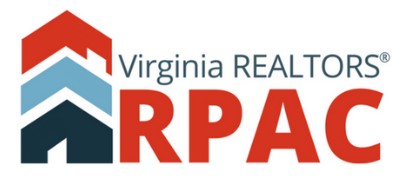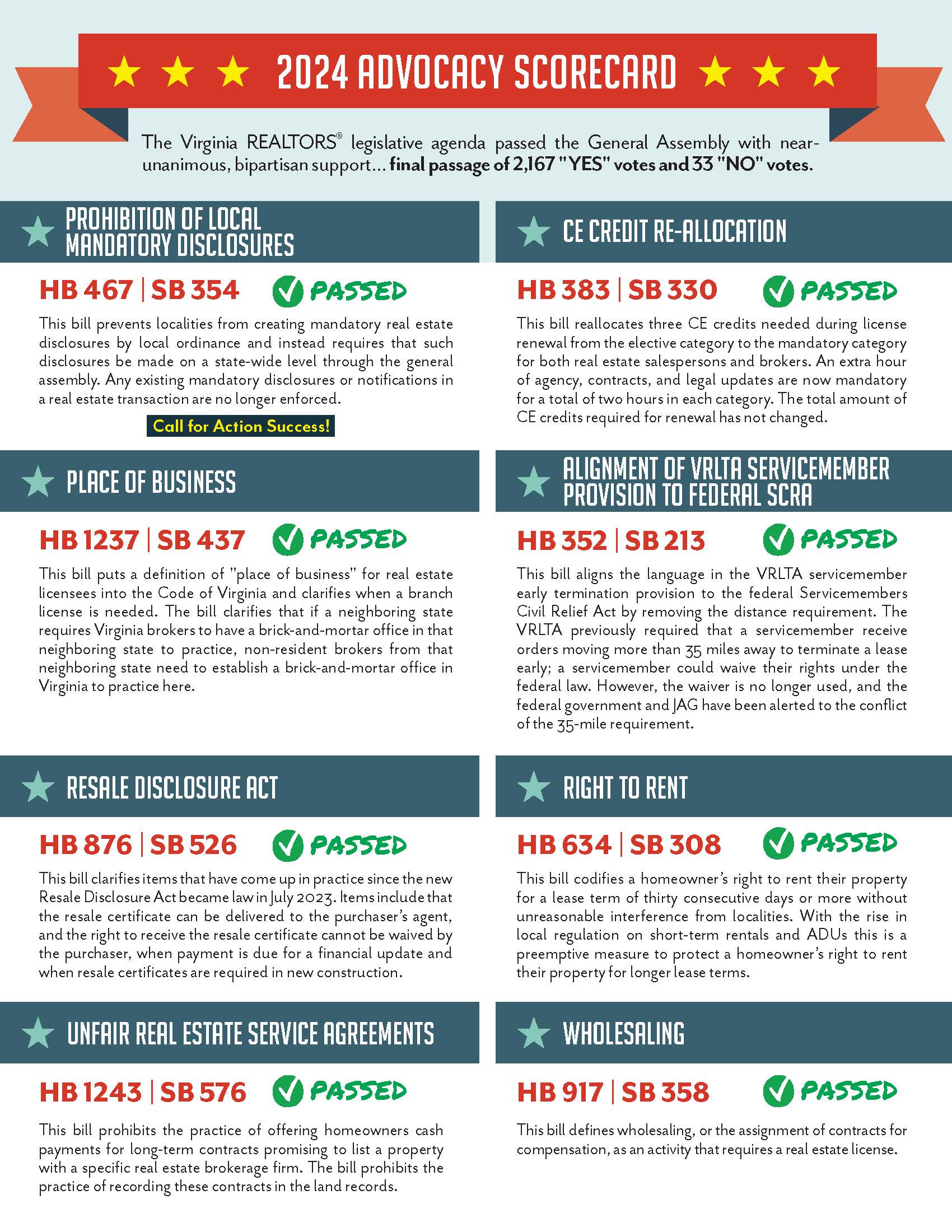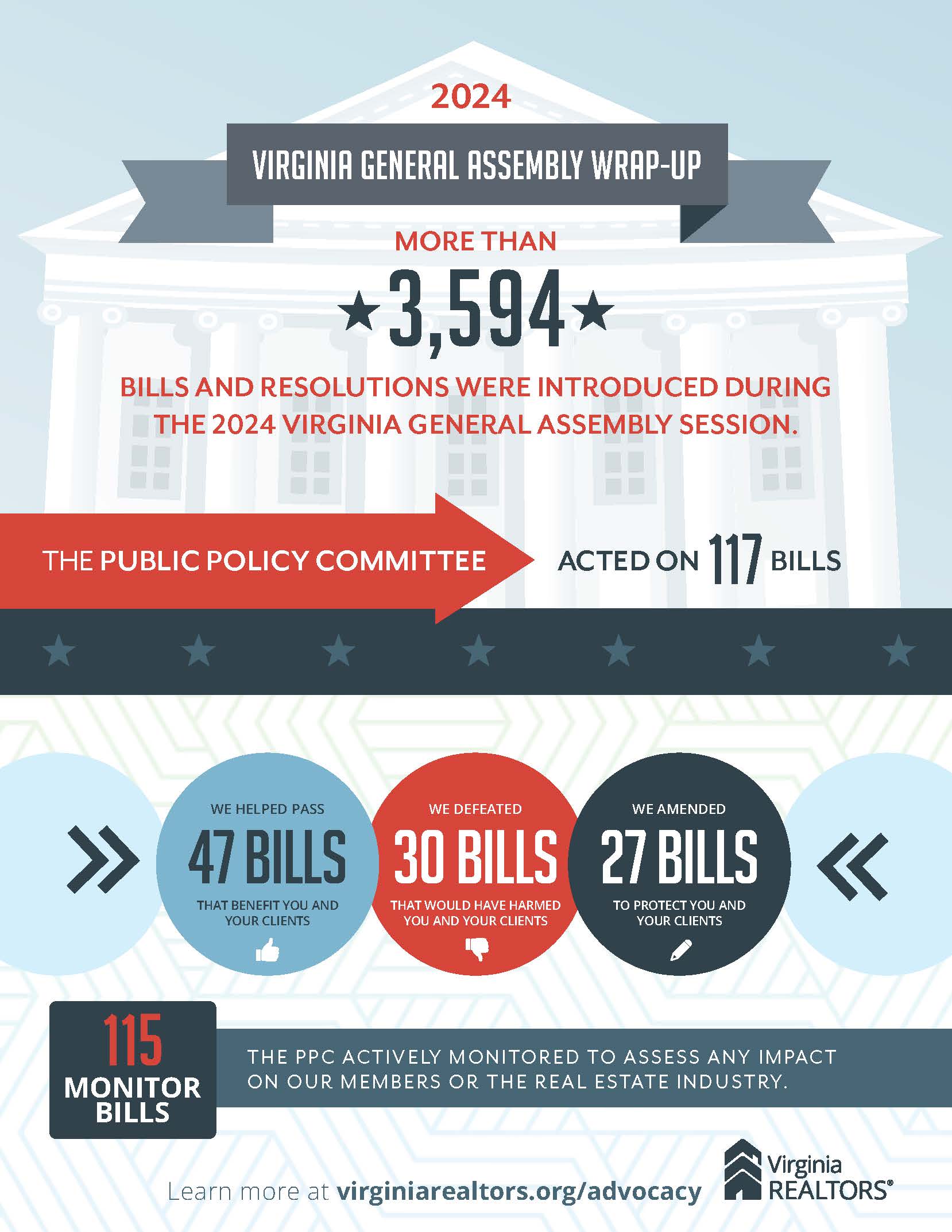
Jump to Section
Purposes and Objectives
Legislative Updates
Elected Officials
FAQs about RPAC
Purpose and Objectives
The single, most outstanding characteristic that sets REALTORS® apart from other real estate practitioners is the willingness to accept and abide by the Code of Ethics of the NATIONAL ASSOCIATION OF REALTORS®. The Code of Ethics, which was first adopted on July 29, 1913, is a living document–responsive in its content to changes in the law and industry. The Code has been revised several times through the years to reflect current developments in professional real estate practice. The term REALTOR® has come to represent competency, fairness, and high integrity. These qualities stem from voluntary adherence to an ideal of moral conduct in real estate business practices.
But even with the best of intention, planning and preparation, occasional disagreements arise between REALTORS® and/or between REALTORS® and their clients or customers. The Williamsburg Area Association of REALTORS® (WAAR) offers its members and their clients and customers a method to resolve complaints if they believe a REALTOR® may have acted in an unethical manner. An ethics hearing may be held and REALTORS® judged by their peers to determine if the code of ethics had been violated.
The Public Policy Team of the Williamsburg Area Association of REALTORS is dedicated to protecting YOU, your profession and business. We utilize several different committees and coalitions and full-time staff professionals to effectively and efficiently achieve this goal such as lobbying against legislative and regulatory proposals that can negatively impact our real estate industry. Our Public Policy Program also includes:
■ Monitoring municipalities: James City County, York County, New Kent County and the City of Williamsburg
■ An active Public Policy Committee
■ History of setting record RPAC fundraising goals
■ A Legislative Director/Consultant to monitor local, state and national issues
■ Political candidate screening
■ Call-to-action website for local, state and national issues
REALTOR® representation in government is critical to creating and maintaining the most positive environment for our industry. We encourage you to become a politically active and informed REALTOR®, and join us as we continue to protect your livelihood. When informed REALTORS® speak their minds, lawmakers listen.
Legislative Updates
Elected Officials
United States Senate
United States House of Representatives
Frequently Asked Questions About RPAC
What is RPAC of Virginia?
RPAC of Virginia is a voluntary political action committee whose membership consists of REALTORS® and others interested in actively and effectively protecting the real estate industry and the dream of home ownership by participating in governmental affairs at the local, state and federal levels.
How does RPAC of Virginia protect the real estate industry?
RPAC of Virginia helps protect the industry by funding those candidates for elective office who best represent the concerns of this industry. In this way, RPAC of Virginia impacts key issues in the General Assembly (like defeating transfer taxes and impact fees and protecting REALTOR® interests). Many other issues of importance to the membership of the Virginia Association of REALTORS® are also affected by RPAC of Virginia’s activities.
Who decides what issues will be funded and what candidates will be endorsed?
On the national level, the National Association of REALTORS® RPAC Trustees make those decisions. On the state level, the RPAC of Virginia Trustees make those decisions, and on the local level, each local association makes those decisions or has a committee which does so.
If all three levels of government are involved in RPAC of Virginia, where does my money go?
Thirty percent of your RPAC of Virginia investment goes to NAR who uses your dollars to participate in very costly federal elections. Seventy percent stays in Virginia to protect the industry at the state and local levels.
Isn’t giving RPAC money equivalent to buying a candidate’s vote?
No. At the federal level, there are strict PAC spending limits set for each election. At the state level, RPAC of Virginia bases the amount of money contributed on how costly the candidate’s race should be based on opposition and media markets. On average, RPAC of Virginia contributions to candidates are modest, ranging between $500 and $2,500. That’s hardly enough to “buy” a vote.
What are some of the factors considered before the RPAC of Virginia Trustees make a donation to a General Assembly candidate?
If the candidate is an incumbent, the Trustees look at how well the candidate has worked with the local REALTORS® he/she represents, how he/she voted on key issues and worked with VAR lobbyists, what committees he/she serves on, and what his/her chances are for re-election. If the candidate is not an incumbent, then the Trustees rely heavily on answers to candidate questionnaires and local association input from candidate interviews.
Is RPAC of Virginia affiliated with either major political party?
No. RPAC of Virginia is not affiliated with the Republican or the Democratic Parties, and does not support one candidate over the other because of party affiliation. RPAC of Virginia supports only those candidates who have indicated or demonstrated that they are interested in pro-REALTOR® or pro-business issues.
How can I support RPAC of Virginia when it funds candidates with whom I disagree?
Again, RPAC of Virginia only concerns itself with the voting record a candidate has on
REALTOR® issues. As a member whose livelihood depends on many factors related to the buying and selling of homes, all members should support RPAC of Virginia in order to help improve the business climate for the real estate industry.
Do RPAC of Virginia Trustees ever fund both candidates in a House of Delegates or Senate race?
While the Trustees have “dual”-funded many elections in the past, they now recognize that this often results in wasteful spending. The Trustees encourage Local Associations to interview all candidates for state offices and make a recommendation to RPAC of Virginia based on the interview process. While the Trustees can “dual”-fund a race, it takes the approval of three-quarters of the voting Trustees present at any meeting to do so.
What is the position of the RPAC of Virginia Trustees concerning funding of “REALTOR®” candidates?
While the RPAC of Virginia Trustees do want to promote REALTOR® candidates, it is important to note that just because the candidate is a REALTOR®, it does not mean he/she will receive a RPAC of Virginia endorsement. Like the National RPAC Trustees, the RPAC of Virginia Trustees are guided by a number of factors which hopefully will lead to a decision that is best for the overall good of the Association.
How can I get involved?
RPAC of Virginia involvement can take the form of a monetary commitment or a commitment of one’s time. Since the RPAC of Virginia Campaign and the political process is ongoing, both forms of commitment are needed.
Major Investors include:
Platinum R – investing $10,000 or more
Golden R – investing $5,000-$9,999
Crystal R – investing $2,500-$4,999
Sterling R – investing $1,000-$2,499
What are the giving levels of RPAC of Virginia investors?
There are several annual giving levels of RPAC of Virginia contributors. They are:
Governor’s Club – Investing $500-$999
Capitol Insider Club – Investing $250-$499
99 Club – Investing $99-$249


